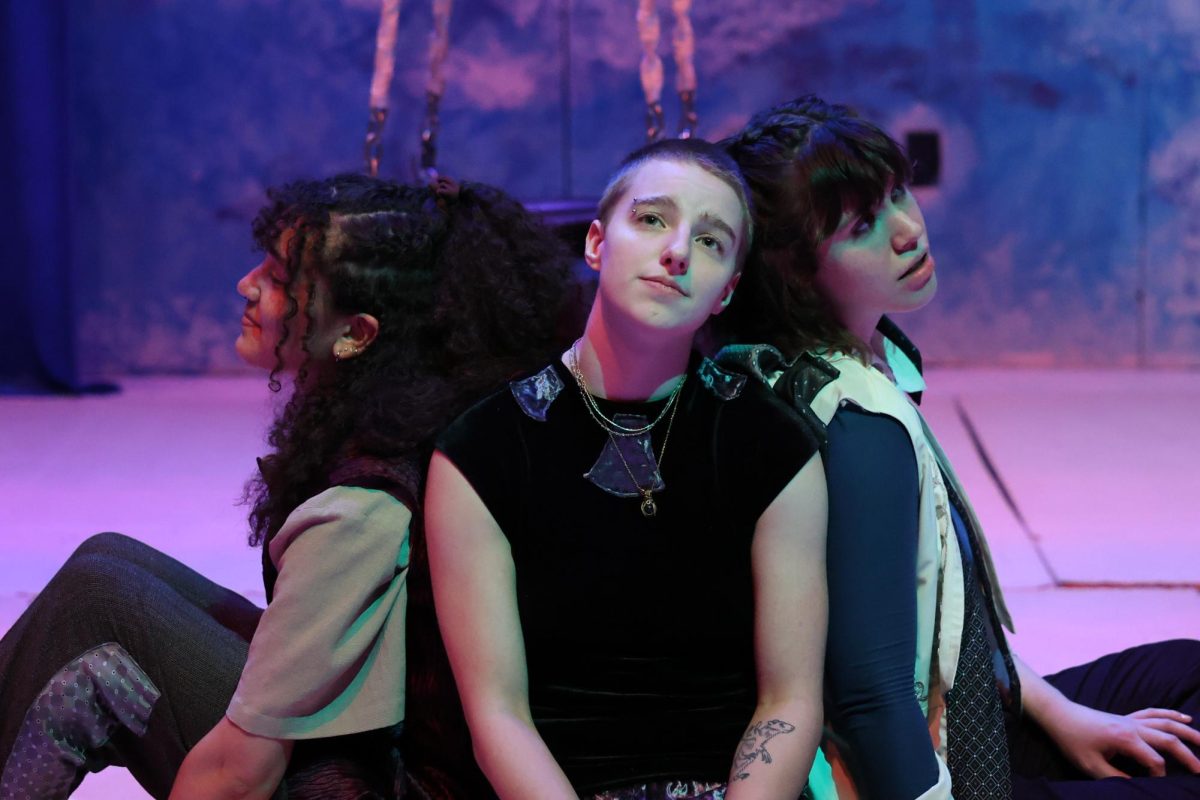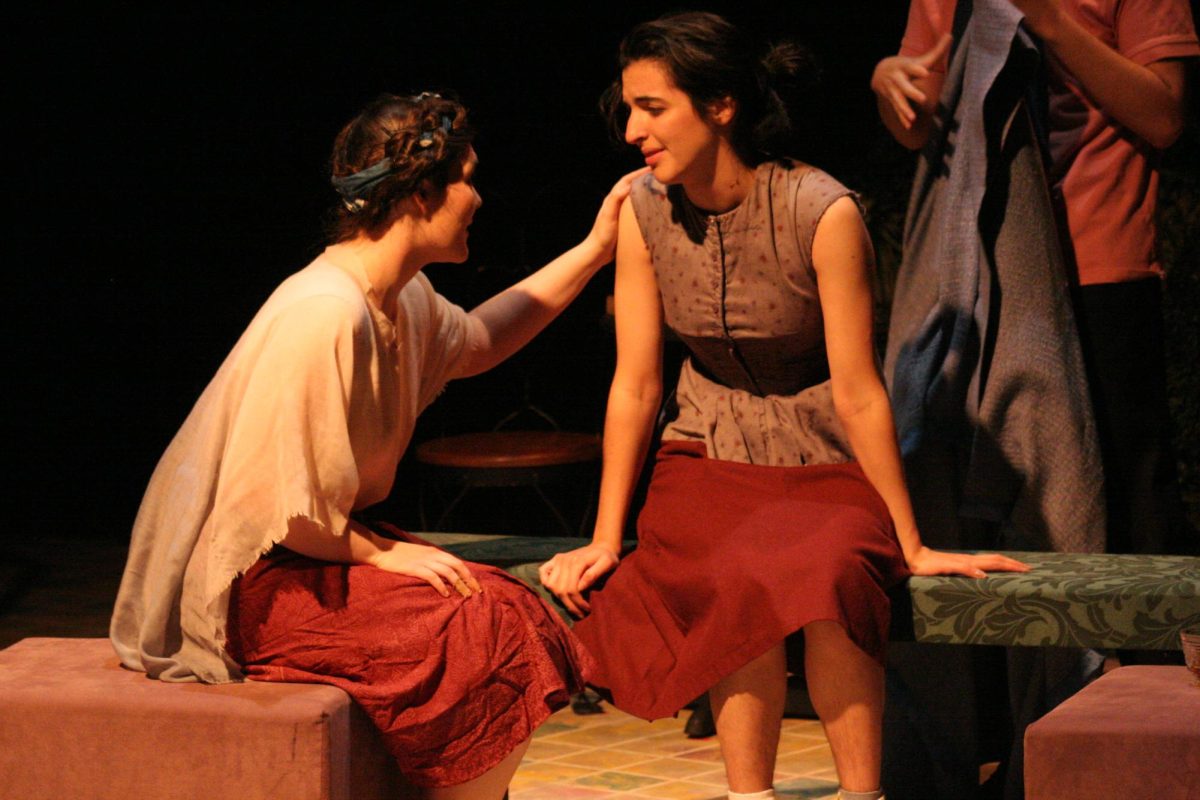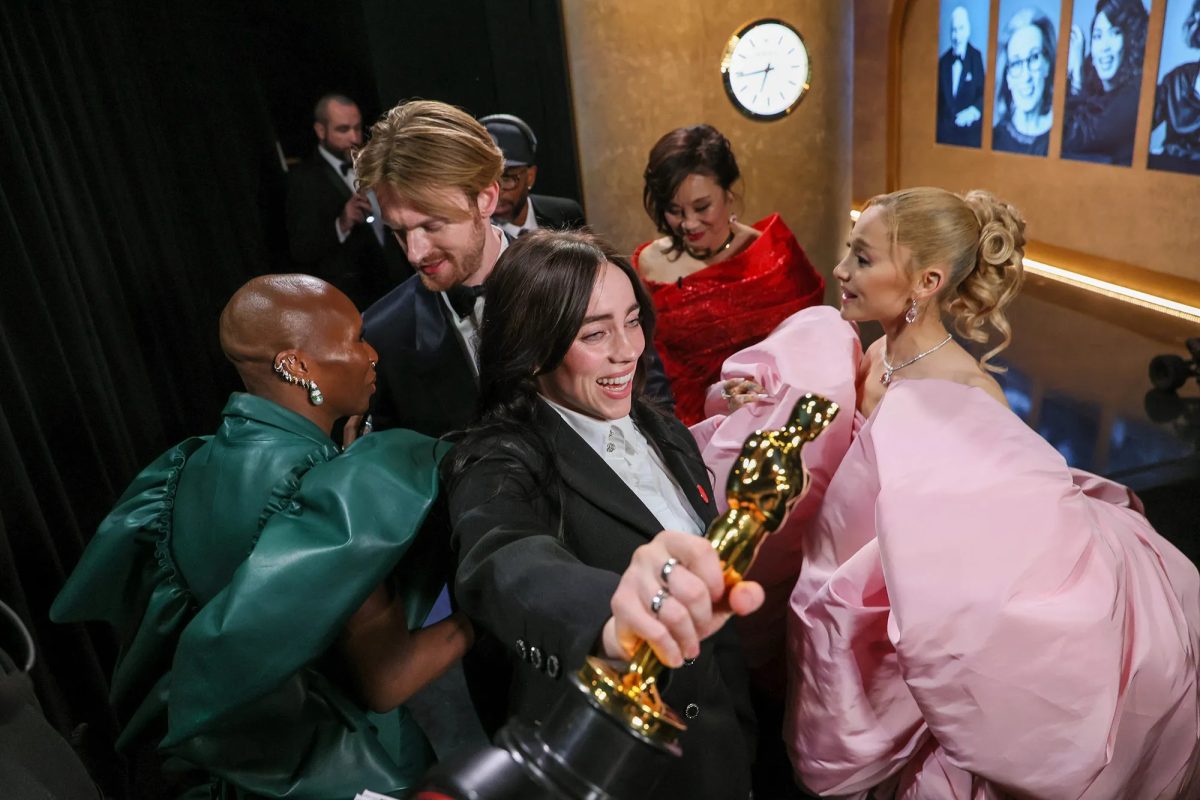In a black box in Kander Theater, a blue-and-white painted cloud with a tire swing hanging from the ceiling at the center surrounded the stage and set the scene for Falling Westward, presented Feb. 3–6. All parts of the play, including the set, reflect the care that College fourth-year Graciela Fernandez put into executing this production that has been in the works since her first year in college.
The three actors, College fourth-year Kendra Dwyer, College third-year Mac McKinzie, and College fourth-year Belle Pflanz, keep the audience excited and drawn-in with their well-executed choreography to original music. This feeling of excitement and exploration drives the show in which, between the end of the world and the beginning of time, two fallen angels, Tami and Koka (Little Star), sit in God’s junk drawer, awaiting the fate of humanity that Eve decides. Dwyer and Pflanz shared the role of Tamibiel (Tami), and McKinzie played the role of Kokabiel (Koka). The cast projected lines that explore the depths of exploration, loss, and regret, among other themes.
Production began for the cast and crew in September, but Fernandez began conceptualizing and writing this play in her notes app at the end of her first year, describing it as coming to her in a fever dream.
“[At the end of the first year] you’re about to go into the summer, and you’re also just being hit with the realization that, God, this is my first year of college and it’s over,” Fernandez said. “[You ask yourself,] who am I? How have I changed? I’m about to go home, and everything’s different. I was asking myself these questions constantly, and it manifested in a horrible anxiety dream of these little angels sitting on a cliff talking to each other.”
Along the sides of the stage in Kander Theater, stagehands gradually add props throughout the play to set the scene of God’s junk drawer. These props include, but are not limited to, books including the Bible, a spyglass, and a trumpet. Each prop elicits a feeling of exploration among the characters, permeating the minds in the crowd.
“The goal was to find random things [for props] that also fit in the color scheme of the show, but that was the only requirement,” College second-year and stage manager Ani Adell said. “It was just random objects. That way, the characters could experiment with them, try them out, and see how humans would use them.”
Additionally, some props and their messages were accidental, such as a toy snake referencing the snake in the Garden of Eden. Many of these props suggested experimentation and figuring things out.
“It’s about these angels figuring out humanity and what it means to be human,” Adell said. “There’s a [dance] scene in the show where [one of] the two Tami angels are playing with the globe, almost like a baby bottle, and that’s supposed to show how babies would just be handed an item and mess around with it.”
While the props add to the show’s themes, so does the set, which the crew collaborated on. The tire swing, for instance, originally represents a playground but soon manifests itself as a symbol of flight between the two characters. Furthermore, the swing allows for movement and choreography that isn’t typically exhibited in theater or dance shows.
With a liberal lens on this Christian creation myth and a queer idea of fallen angel lore, Fernandez has used her senior capstone project to bring this play to life. In turn, it has left people at a loss for words by sharing themes of uncertainty, communication, a fear of change, and cyclicality.
“It’s not that you leave being like, ‘What did I just watch?’ but you leave being like, ‘I feel a lot of things and I don’t know why because [Koka and Tami] are also feeling a lot of things and they don’t know why,” Fernandez said. “It’s scary to realize that you have a brain and that other people have brains and they also have feelings about you and you have feelings about them. Just realizing that you’re a person that exists in the world is terrifying.”
The play encouraged each of the actors to think about their lives differently and in some ways gave them comfort.
“I think it’s really interesting to think about on the enormous scale of divine beings who have known each other for trillions of years,” McKinzie said. “And they’re still involved in petty conflict and are embarrassed to say how they feel and are struggling to communicate what’s in their hearts in a very human way.”
Dwyer noted that as they performed the play and became immersed in it, she began to think more about many topics present in the play.
“As we performed it more and more, I just thought about death more and more, which is cool,” Dwyer said.
McKinzie shared this sentiment.
“It’s forced me to think about how death gives life meaning,” McKinzie said. “The enormous burden of mortality is something you have to shoulder to keep your feet on the ground.”
While this show can be seen as a commentary on mortality and immortality, Pflanz sees it as a commentary on embracing that mortality.
“[The show] ends happily because they’re embracing their mortality, and I don’t think it’s a sinister thing, and I don’t think it’s a story about depression, necessarily,” Pflanz said. “I think it has something that says it’s beautiful to be alive.”
In working with Fernandez, the cast felt free to explore the work, just as the two characters did with mortality, what it means to be alive, to fear change, and to be uncertain. Each actor enjoyed working with Fernandez and appreciated her insights and trust.
“[Fernandez] was very open to us interpreting her work,” McKinzie said. “I feel very lucky we had a director who trusted us to bring her vision to life.”
As mentioned earlier, Tami’s role is taken on by two actors, Dwyer and Pflanz. Fernandez did this because representing Tami as one person doesn’t do justice to the complexity of the character.
“Tami has to be two people because they are constantly changing and are always conflicted about what they want, how they perceive themselves, and how they feel about Koka,” Fernandez said. “And that’s not to say that Koka doesn’t contain multitudes in the same way, but I think in the way that they express themselves, they have to be one person because they are so set on just one path. When they know what they want, that is what they want, and they go for it.”
Fernandez also felt drawn to choreography specifically because it could add something to the play that words could not. Given that the first scene of the play contains no words, just the movement of the tire swing, Tamibiel pushing Kokabiel to get as high as possible, but seeming to never really reach the point that was intended, the dances that are done by each of the actors continue to add to this theme of uncertainty and exploration.
“I think movement is far more expressive than words could ever be, and that’s not to discredit writing or anything; I’m a writer myself,” Fernandez said. “I think you do a disservice to any art if it doesn’t make you want to move in some way, like cry, crumple, laugh, or whatever.”
While all of the original music, sound, lighting, and words exchanged created a scene that reflected Fernandez’s feelings, she hoped that people would come away from experiencing the show with questions.
“I think I look at [the show like] you might look at a drawing that a four-year-old will give you,” Fernandez said. “This is really sweet, and this feels familiar and unfamiliar at the same time. And I don’t really know what I’m looking at, but it makes me feel something, and that’s dope.”
Fernandez plans to continue incorporating a queer and liberal perspective into her future work, creating works that reflect her feelings as someone who identifies with being queer and continually changing. She also plans to let her audience sit in their discomfort after experiencing her work.
“I am really proud of the work I’ve done,” Fernandez said. “I’m really proud of my actors and my team. And I hope they’re proud of themselves.”










